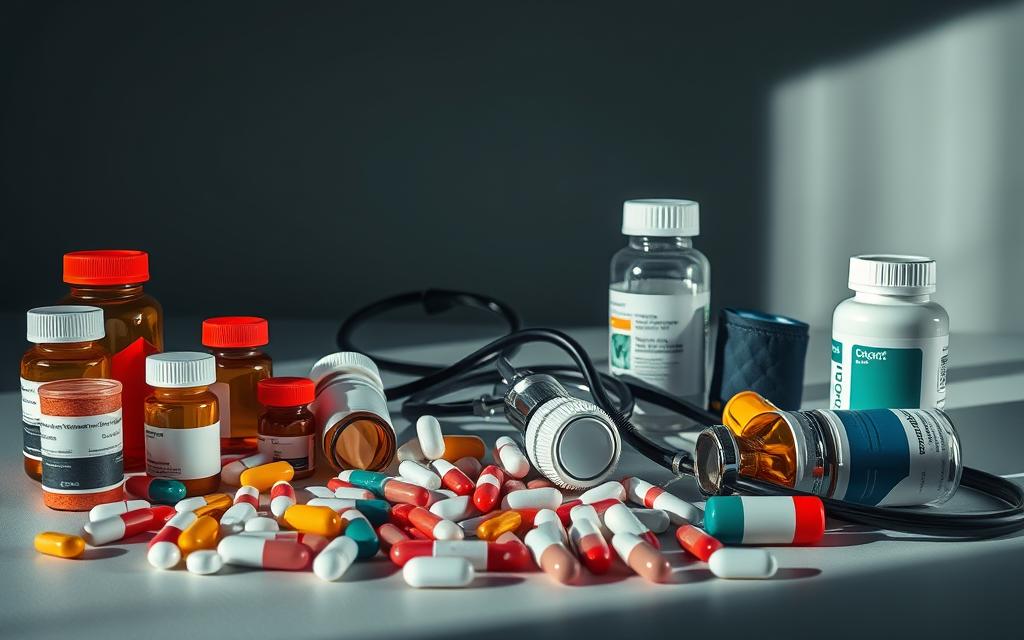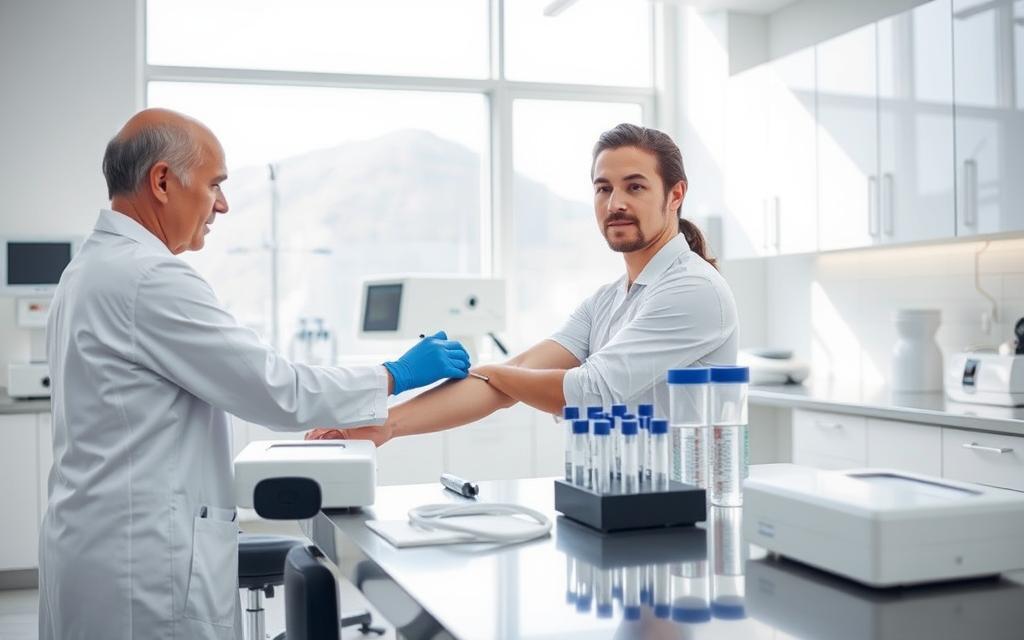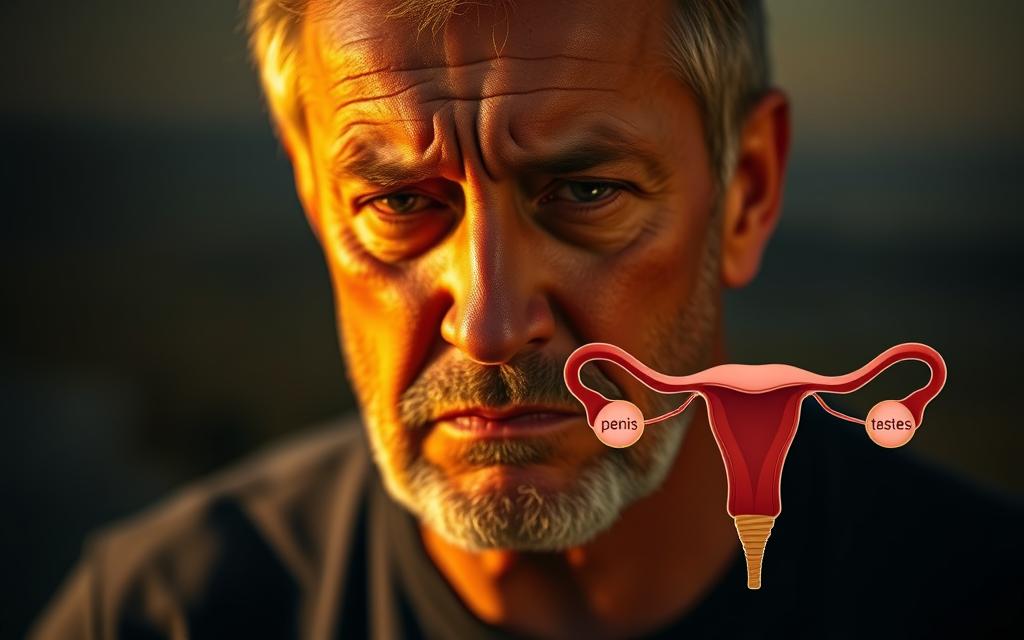High Testosterone and Erectile Dysfunction: Causes, Symptoms, and Treatment Options
Understanding the complex relationship between high testosterone and erectile dysfunction is crucial for men’s health. While testosterone is essential for sexual function, unusually high levels can sometimes lead to sexual health issues, including erectile dysfunction.
Erectile dysfunction, or ED, is a condition that affects a man’s ability to achieve or maintain an erection. The causes can be varied, ranging from hormonal imbalances to underlying health conditions. In this article, we will explore the link between high testosterone and erectile dysfunction, discussing the ED causes and symptoms, as well as the available treatment options to improve sexual health.
Understanding the Relationship Between Testosterone and Erectile Function
Testosterone plays a crucial role in male sexual health, influencing erectile function in various ways. It is a key hormone that regulates libido, sperm production, and the overall health of the male reproductive system.
The Role of Testosterone in Male Sexual Health
Testosterone is essential for maintaining healthy erectile function. It helps to regulate the production of nitric oxide, a molecule that relaxes the blood vessels in the penis, allowing for increased blood flow and enabling an erection. Low testosterone levels have been linked to erectile dysfunction (ED), but the relationship between high testosterone and ED is more complex. For more information on boosting testosterone levels, you can visit Colorado Urologists.
Can High Testosterone Levels Cause ED?
While testosterone is crucial for erectile function, excessively high levels can potentially lead to negative effects on sexual health. Some studies suggest that very high testosterone levels may cause an imbalance in other hormones, potentially contributing to ED. However, this is not a straightforward cause-and-effect relationship, and other factors such as overall health, lifestyle, and psychological state also play significant roles.
| Hormone Level | Effect on Erectile Function |
|---|---|
| Low Testosterone | Often associated with erectile dysfunction |
| Normal Testosterone | Supports healthy erectile function |
| High Testosterone | Potential for negative effects, but complex relationship with ED |
The Paradox of High Testosterone and Erectile Dysfunction
Erectile dysfunction can occur in men with high testosterone, presenting a paradox that challenges the conventional understanding of testosterone’s role in sexual health. This phenomenon suggests that the relationship between testosterone and erectile function is more complex than previously thought. Understanding this paradox requires examining the normal range of testosterone levels in men and how elevated levels can affect sexual function.
Normal Testosterone Levels in Men
Normal testosterone levels in men typically range from 300 to 1,000 nanograms per deciliter (ng/dL), with an average of around 600 ng/dL. Levels outside this range can lead to various health issues, including sexual dysfunction. Maintaining testosterone within the normal range is crucial for overall male health.
How Elevated Testosterone Affects Sexual Function
Elevated testosterone levels can have both positive and negative effects on sexual function. On the positive side, high testosterone can enhance libido and sexual performance. However, excessively high levels can lead to negative effects such as aggression, anxiety, and potentially erectile dysfunction. The key is finding a balance within the normal range to support healthy sexual function.
- High libido
- Improved sexual performance
- Potential for negative effects with excessively high levels
Common Causes of Erectile Dysfunction Despite High Testosterone
Erectile dysfunction (ED) is a complex condition that can arise even in men with high testosterone levels, and understanding its causes is crucial for effective treatment. While testosterone plays a significant role in male sexual health, other factors can influence erectile function.
Several underlying causes can contribute to ED in men with high testosterone. These causes can be broadly categorized into psychological, vascular, neurological, and hormonal factors.
Psychological Factors
Psychological factors, such as stress, anxiety, and depression, can significantly impact erectile function. These conditions can lead to ED by affecting a man’s ability to relax and achieve an erection. Treatment for these conditions often involves a combination of therapy and medication.
Vascular Issues
Vascular issues, including high blood pressure and atherosclerosis, can damage blood vessels and restrict blood flow to the penis, leading to ED. Maintaining a healthy lifestyle, including a balanced diet and regular exercise, can help mitigate these risks.
Neurological Conditions
Neurological conditions, such as diabetes, multiple sclerosis, and Parkinson’s disease, can damage nerve pathways and disrupt erectile function. Managing these conditions effectively is crucial for maintaining sexual health.
Hormonal Imbalances Beyond Testosterone
Hormonal imbalances beyond testosterone, including thyroid disorders and prolactin imbalances, can also contribute to ED. A comprehensive hormonal evaluation is necessary to identify and treat these imbalances.
In conclusion, ED in men with high testosterone is a multifaceted issue requiring a comprehensive approach to diagnosis and treatment. By understanding the various causes, healthcare providers can develop effective treatment plans to address ED and improve overall sexual health.
- Psychological factors like stress and anxiety
- Vascular issues such as high blood pressure
- Neurological conditions like diabetes
- Hormonal imbalances beyond testosterone
Drugs That Cause Erectile Dysfunction
Many commonly prescribed drugs can lead to erectile dysfunction. While these medications are intended to treat various health conditions, their side effects can sometimes impact sexual health.
Blood Pressure Medications
Blood pressure medications are among the most commonly prescribed drugs that can cause erectile dysfunction. These medications can affect blood flow, which is crucial for achieving and maintaining an erection.
Beta Blockers
Beta blockers, used to treat high blood pressure and heart conditions, can reduce blood flow to the penis, making it difficult to achieve an erection. Examples include propranolol and metoprolol.
Diuretics
Diuretics, also known as water pills, can cause erectile dysfunction by reducing blood volume and affecting blood flow. Common diuretics include hydrochlorothiazide and furosemide.
Antidepressants and Psychiatric Medications
Antidepressants and psychiatric medications can also contribute to erectile dysfunction. These drugs can affect neurotransmitters in the brain that regulate sexual function.
SSRIs and SNRIs
Selective serotonin reuptake inhibitors (SSRIs) and serotonin-norepinephrine reuptake inhibitors (SNRIs) are types of antidepressants that can cause erectile dysfunction. Examples include fluoxetine (Prozac) and venlafaxine (Effexor).
Antipsychotics
Antipsychotic medications, used to treat psychiatric conditions like schizophrenia, can also lead to erectile dysfunction. Examples include risperidone and olanzapine.
Hormonal Treatments and Steroids
Hormonal treatments and steroids can disrupt the body’s natural hormone balance, potentially leading to erectile dysfunction. This includes treatments for prostate cancer and anabolic steroids used for muscle building.
Recreational Drugs and Alcohol
Recreational drugs and excessive alcohol consumption can significantly impact erectile function. Substances like cocaine, marijuana, and heroin can affect blood flow and neurotransmitter balance.

| Drug Category | Examples | Potential Impact on Erectile Function |
|---|---|---|
| Blood Pressure Medications | Beta blockers, Diuretics | Reduced blood flow |
| Antidepressants and Psychiatric Medications | SSRIs, SNRIs, Antipsychotics | Affects neurotransmitters |
| Hormonal Treatments and Steroids | Prostate cancer treatments, Anabolic steroids | Disrupts hormone balance |
| Recreational Drugs and Alcohol | Cocaine, Marijuana, Heroin, Alcohol | Affects blood flow and neurotransmitters |
Understanding the potential side effects of these drugs can help individuals and healthcare providers make informed decisions about treatment options.
Recognizing Symptoms of ED with High Testosterone
Despite having high testosterone, men can suffer from erectile dysfunction, and knowing the symptoms can help in seeking treatment. Erectile dysfunction (ED) is a condition that affects a man’s ability to achieve or maintain an erection sufficient for satisfactory sexual performance.
Physical Symptoms
Physical symptoms of ED can be quite distinct. They include:
- Difficulty achieving an erection
- Inability to maintain an erection
- Reduced firmness of erections
These symptoms can be indicative of underlying issues that need medical attention. A comprehensive table outlining common physical symptoms is provided below:
| Symptom | Description | Possible Cause |
|---|---|---|
| Difficulty achieving an erection | Struggling to get an erection | Poor blood flow, nerve damage |
| Inability to maintain an erection | Erection is lost during sexual activity | Low blood pressure, stress |
| Reduced firmness of erections | Erections are not as firm as they used to be | Aging, hormonal imbalance |
Psychological Indicators
Psychological indicators can also play a significant role in ED. These include:
- Stress and anxiety related to sexual performance
- Depression or low self-esteem
- Relationship issues
Addressing these psychological factors is crucial for effective treatment. Men experiencing these symptoms should consult a healthcare professional for guidance.
Diagnosis: Testing for High Testosterone and ED
To accurately diagnose high testosterone and erectile dysfunction, healthcare professionals employ various diagnostic tools. The diagnostic process is crucial for identifying the underlying causes of ED in men with high testosterone levels.
Blood Tests and Hormone Panels
Blood tests are a critical component in diagnosing hormonal imbalances, including high testosterone levels. A hormone panel, which includes testosterone levels, helps healthcare providers understand the hormonal environment that may be contributing to ED. These tests are typically conducted in the morning when testosterone levels are highest.
- Total Testosterone Test: Measures the overall level of testosterone in the blood.
- Free Testosterone Test: Measures the level of testosterone that is not bound to proteins in the blood.
- Luteinizing Hormone (LH) and Follicle-Stimulating Hormone (FSH) Tests: Help assess the functioning of the pituitary gland and its impact on testosterone production.
Physical Examinations and Medical History
A comprehensive physical examination and detailed medical history are essential for diagnosing the causes of ED. Healthcare providers look for signs of underlying conditions that could be contributing to ED, such as vascular disease or neurological disorders.

During the physical examination, healthcare providers may check for physical signs that could indicate the underlying cause of ED. A thorough medical history helps identify potential risk factors and guides further diagnostic testing.
Treatment Options for ED with High Testosterone
Treating erectile dysfunction in men with high testosterone involves exploring various therapeutic strategies. While high testosterone is generally associated with male virility, its presence in men with ED requires a nuanced approach to treatment.
Medication Adjustments and Alternatives
For men with ED and high testosterone, reviewing current medications is crucial. Certain drugs, such as some antidepressants and blood pressure medications, can contribute to ED. Adjusting or changing these medications can potentially alleviate symptoms. For instance, switching from a beta-blocker to an ACE inhibitor or an ARB may help. It’s also essential to consider alternative treatments that do not interfere with erectile function.
Lifestyle Modifications
Lifestyle changes play a significant role in managing ED. Regular exercise, a balanced diet, and weight management can improve overall vascular health, potentially enhancing erectile function. Additionally, reducing or eliminating recreational drug use and limiting alcohol consumption can also be beneficial.
ED-Specific Treatments
When lifestyle changes are insufficient, ED-specific treatments may be necessary. Phosphodiesterase type 5 (PDE5) inhibitors, such as sildenafil (Viagra) and tadalafil (Cialis), are commonly prescribed. These medications work by enhancing the effects of nitric oxide, a natural chemical the body produces that relaxes muscles in the penis, increasing blood flow.
Natural Remedies and Supplements
Some men may prefer to explore natural remedies and supplements. While the efficacy of these treatments varies, certain options like L-arginine and ginseng have shown promise in improving erectile function. However, it’s crucial to consult with a healthcare provider before adding any supplements to ensure they won’t interact with other medications.
Conclusion: When to Seek Medical Help and Long-Term Management
Understanding the complex relationship between high testosterone and erectile dysfunction is crucial for effective management. As discussed, various factors contribute to ED, including psychological, vascular, and neurological conditions, despite having high testosterone levels.
Seeking medical help is a critical step in addressing ED and high testosterone. A healthcare professional can provide a comprehensive diagnosis, including blood tests and physical examinations, to identify underlying causes.
Long-term management of ED and high testosterone involves a combination of medication adjustments, lifestyle modifications, and ED-specific treatments. Strategies may include dietary changes, stress management, and exploring natural remedies under medical supervision.
Effective ED management and high testosterone management require a personalized approach. By working closely with a healthcare provider, individuals can develop a tailored plan to improve their sexual health and overall well-being.
